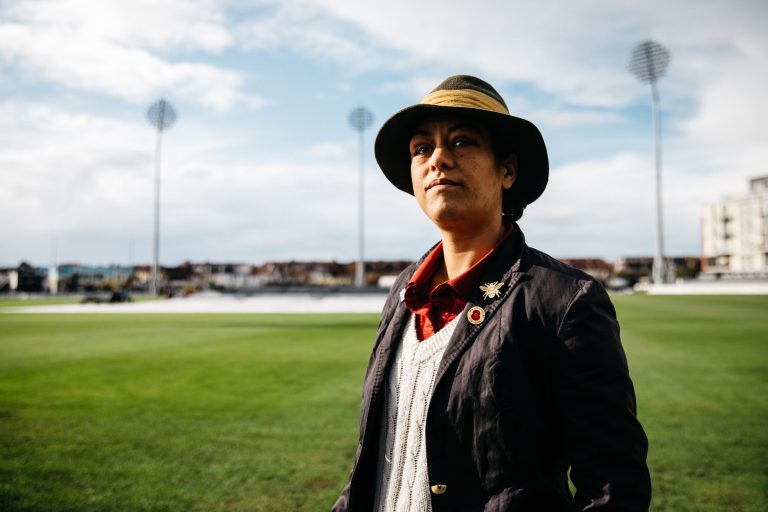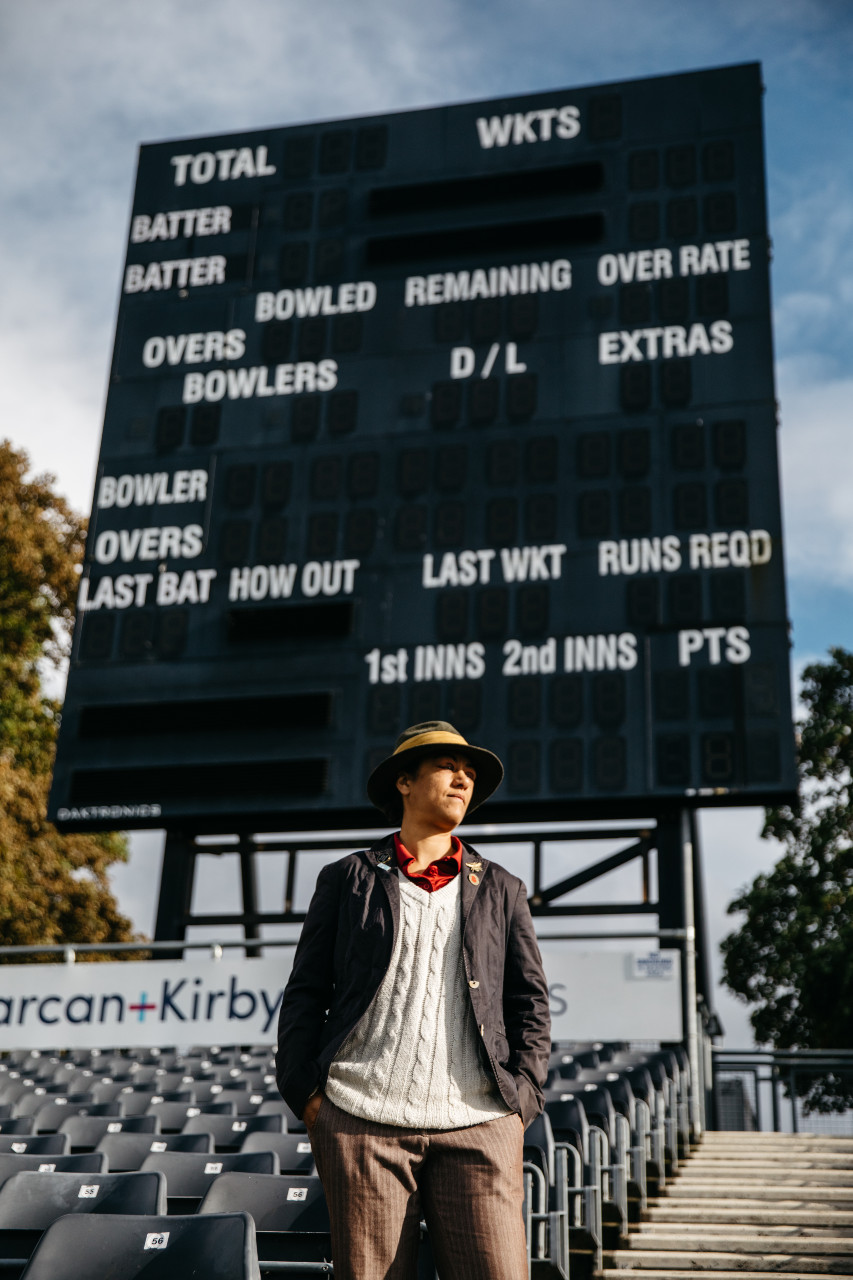‘We need people to step up now’: the Bristolians working to save cricket from climate change

Image of Xeena Cooper, The Next Test chair, at Gloucestershire CC’s ground in Bristol (credit: Alexander Turner)
“Cricket is the epitome of tranquillity,” declares Xeena Cooper from a perch in the stands of a deserted Gloucestershire Cricket Stadium.
It’s late September, and England’s domestic season is drawing to a close. Taking in the perfect view of the pitch and the many buildings of north Bristol beyond, and enjoying a cup of tea from Xeena’s flask, it’s difficult to argue with her.
In few places does cricket capture the imagination and stir the soul as it does in Bristol. WG Grace, often cited as the sport’s first celebrity, used to entertain crowds in the nets at the back of Montpelier’s Old England pub. In 1899, meanwhile, a 13-year-old Clifton College schoolboy, AEJ Collins scored what was for many years held to be the highest ever recorded innings of 628 (not out).
But today we’re here to discuss the game’s relationship with a far from tranquil subject – climate change.
Xeena, a self-described “very slow bowler”, is co-founder and chair of The Next Test, a nonprofit organisation that began life as a Twitter account in 2018. It was set up to highlight cricket’s links to colonialism – acknowledged as being at the roots of global heating – and the risks it now faces as temperatures rise, and to explore solutions that offer a way forward.
‘Drastic rainfall’
It’s been well documented that countries in the Global North bear historical responsibility for climate change while those in the Global South – including test-playing nations such as Pakistan, Bangladesh and South Africa – are bearing the brunt of its impact. Yet even here in Ashley Down, changing weather patterns are taking their toll.
From local clubs, kids’ groups, all the way to the top of the game, we want to be the place where the cricket community can come together and find out about these issues
Xeena Cooper
“The cricket season starts right after the football season – in April, all around the country goalposts are taken down and cricket pitches are set up,” says Xeena. “We are seeing much more intense heat in the height of summer but also much more drastic rainfall – meaning there is less opportunity to play.”
The changes Xeena is talking about do not mean our summers are getting wetter overall, but that rain that does fall will be more intense. In a reminder of 2023’s warm-season downpours, I’m forced to circumvent large puddles of rainwater in the stands of the cricket stadium as I walk to our interview.

Across England, the number of rain -affected one-day international (ODI) matches has more than doubled since 2011. A 2017 report – entitled Game Changer – found cricket was the pitch sport most vulnerable to climate change and that more than 25% of England’s home ODIs since 2001 had been affected by rain.
The Next Test co-founder Tanya Aldred also highlighted the issue in a 2021 article for the BBC, speaking to a number of groundskeepers about the increasing challenges they face. “They interviewed somebody in South Africa, [about how] the pitch is dry which isn’t ideal for cricket,” Xeena’s colleague Tim Wye recalls. “But they also spoke to a groundskeeper at Gloucestershire who says it’s not only got a lot warmer in Bristol, but also a lot wetter.”
“So, he’s like, ‘Oh, do I cover the pitch to keep it dry? In that case, it gets humid, and we get fungal growth in the grass’,” adds Wye, a local Green councillor who is also the opening batsman and occasional wicketkeeper for local ‘climate-concerned cricket team’ team’ Bristol Dodos. Fungal growth and damp ruin pitches and make it difficult to play cricket – with smaller and less well-resourced clubs arguably facing the greatest challenge.
‘Empire was an extractive system’
Members of The Next Test have now begun developing and delivering educational programmes detailing the sport’s relationship with colonialism – it was a tool in the ‘civilising mission’ of the British Empire – and global warming. Gloucestershire CC, which now uses 100% renewable energy and sends 0% of its waste to landfill, has allowed The Next Test to give a series of talks at its ground.
Xeena says the organisation has used this platform to highlight how “in our own nation, we have degraded our landscapes and natural resources – whether it’s through overfishing or industrial farming”. But historically this degradation of natural resources has not been limited to England’s environment, with the industrial revolution being financed from the spoils of colonialism. “Empire was an extractive system,” Xeena says. “It was about going to another place and setting up a plantation or removing the resources from that country.”
The cricketing community isn’t always comfortable talking about this connection to colonisation, Xeena explains – nor about related and much more recent issues of race in the game. In the 1990s, conservative politician Norman Tebbit infamously suggested that the team Pakistani immigrants supported during test matches involving England and Pakistan was an effective barometer of how assimilated they were in Britain. Fast forward to 2023, and this summer’s ICEC report found there was a ‘volume of evidence’ highlighting an enduring deep-seated issue of racism in cricket.
‘The time for action is now’
The Next Test aims to create a more socially conscious cricketing community, and believes educating people about how British colonialism has affected the environments of the test playing nations can help do this. “From the bottom of the game – local clubs, kids’ groups – all the way up to the top, we want to be the place where the cricket community can come together and find out about these issues,” Xeena says.
Looking ahead, the game must also reckon with its ongoing impacts on the environment, ranging from the vast amounts of litter produced at games to the huge distances travelled by international teams in planes. What does the community need to do to combat climate change? Xeena takes a moment to look at the puddles throughout the stands and replies, “We need those heroic voices to step up now.”
“There needs to be a united voice from the pitch to say, this is an issue,” she says. “It is going to impact our game that we love, and all want to play in the future, this is the time [for action] – now.”
The Next Test is looking for new players, writers and researchers with a love for cricket who want to take their first steps into understanding how to solve environmental issues in the game. If you’re not sure what you want to do but you love cricket, there’s probably a place for you – as Xeena states, “There’s lots to be done.”













